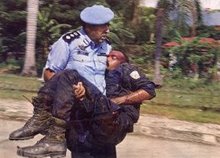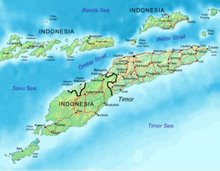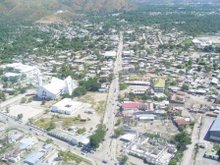DILI, East Timor - A Nobel laureate squared off with two rivals in presidential elections Monday that could test
East Timor's fragile calm a year after one of the world's youngest and poorest nations reached the brink of civil war.
But with a run-off vote expected and crucial parliamentary elections scheduled for later this year, some fear the fledging democracy could suffer through several more months of instability.
Prime Minister Jose Ramos-Horta, who won the 1996 Peace Prize for championing East Timor's struggle to end decades of brutal Indonesian rule, initially had been expected to be the sure winner of the largely ceremonial five-year post.
But election observers now say it is unlikely any of the eight candidates running would receive an outright majority, largely because of public disillusionment with the government.
East Timor was heralded as a success in nation-building when it formally declared independence in 2002, but descended into chaos last year after then-Prime Minister Mari Alkatiri fired a third of the tiny army, triggering gunbattles between rival security forces that spiraled into gang warfare, looting and general lawlessness.
Dozens of people were killed and some 155,000 fled their homes before the young government collapsed.
Nearly 3,000 international peacekeepers deployed to restore order have remained in the country and helped oversee Monday's vote, with Australian and New Zealand soldiers patrolling hot spots in Dili by truck and foot.
Voting was virtually without incident and turnout high, officials said, although ballots failed to arrive at four remote polling booths.
National Election Committee spokesman Martinho Gusmao said Ramos-Horta, an independent, Francisco Guterres, a former guerrilla fighter and a member of Alkatiri's Fretilin party, and Fernando de Araujo of the Democratic Party, another resistance leader, were the top contenders.
Preliminary results were not expected until Wednesday.
"I hope the new president will encourage the people to stop fighting so we can get on with our lives," said Francisca Freitas, a 38-year-old mother of four who lined up before dawn and was one of 522,000 eligible voters.
Rapid-reaction helicopters were sent to deliver 5,000 extra ballots to remote stations that had run out.
The current president is Xanana Gusmao, revered nationwide for helping lead the resistance against Indonesian occupation.
Analysts see the balloting as a trial run for crucial general elections in June that will determine the composition of a new government and parliament.
Gusmao, who will run for prime minister, waited in line with everyone else Monday to cast his ballot.
"I'm happy because we have the right to vote for people to choose the right president," he said, his son standing by his side.
Whoever wins will face tremendous challenges, from reconciling deep social divisions and restoring law and order to returning tens of thousands of refugees to their homes. The country also remains desperately poor, with unemployment hovering at 50 percent and an alarming 60 percent of children under 5 malnourished.
"If I win, I will bear a wooden cross almost as heavy as Christ's," said Ramos-Horta, 57, who said he would actually prefer to retire, write books and travel abroad to give lectures. "If I lose, I will win my freedom."
segunda-feira, 9 de abril de 2007
Subscrever:
Enviar feedback (Atom)







Sem comentários:
Enviar um comentário